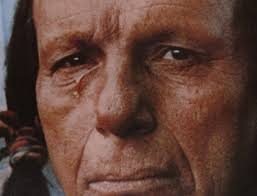
The Transient Power of a Tear
A public-service TV “commercial” back in the 1970s shows an obviously Native American canoeing a river. Smokestacks shoot particles into the air, forming smog. Garbage floats by. A close-up shows a single tear rolling down the man’s cheek. The announcer says, “People start pollution. People can stop it.”
Turns out that the actor, who had played a Native American in numerous movies and TV shows, was actually a second-generation Italian. But that didn’t alter the power of the message. Millions of Americans who saw it thought twice about throwing trash from their car windows or abandoning messy campsites.
It was the kind of message needed to move Americans from indifference and apathy to concern about the environment. But it wasn’t nearly enough, and the kind of pollution the commercial targeted isn’t that important in the tragedy-waiting-to-happen that is global warming. The major villains are industrial emissions and exhaust fumes.
Relevance?
Before going any further, I must again address the issue of relevance. “What does global warming have to do with the search for God?” you may ask. Many say it’s purely a political issue and has no place in a “discussion of faith, belief and religion,” as promised on this blog’s main page.
But the search for God isn’t just about trying to figure out why we believe or don’t believe. We find God, too, by becoming more God-like, by helping bring about what is prayed for in the “Our Father” when “Thy Kingdom Come” is recited. But more about this later.
This blog was motivated by a recent media report whose headline on the National Public Radio website screamed, “Massive Government Report Says Climate Is Warming and Humans Are the Cause.”
“It is ‘extremely likely’ that human activities are the ‘dominant cause’ of global warming, according to the most comprehensive study ever of climate science by U.S. government researchers. The climate report, obtained by NPR, notes that the past 115 years are ‘the warmest in the history of modern civilization.’
“The global average temperature has increased by about 1.8 degrees Fahrenheit over that period. Greenhouse gases from industry and agriculture are by far the biggest contributor to warming.”
“The report states that the global climate will continue to warm. How much, it says, ‘will depend primarily on the amount of greenhouse gases (especially carbon dioxide) emitted globally.’ Without major reductions in emissions, it says, the increase in annual average global temperature could reach 9 degrees Fahrenheit relative to pre-industrial times. Efforts to reduce emissions, it says, would slow the rate of warming.”
This information isn’t really new. Still, many Americans – including Christians and other believers – care little about global warming, according to polls. People searching for God, however, should do all they can to care for the earth, including vote for people, regardless of political party, who want to curb global warming.
Back to the question of why this issue is relevant. In 2015, Pope Francis issued his encyclical, Laudato Si, “On Care for our Common Home.”
“Saint Francis of Assisi (from whom Pope Francis took his name) reminds us that our common home is like a sister with whom we share our life and a beautiful mother who opens her arms to embrace us,” the pope writes.
Lords and Masters
“This sister now cries out to us because of the harm we have inflicted on her by our irresponsible use and abuse of the goods with which God has endowed her. We have come to see ourselves as her lords and masters, entitled to plunder her at will. The violence present in our hearts, wounded by sin, is also reflected in the symptoms of sickness evident in the soil, in the water, in the air and in all forms of life.”
Many believe that religion has to do with “the next life,” not this one. But doesn’t indifference about the fate of our world show ingratitude? That’s why other popes, and leaders of many religions, have urged believers and non-believers to show their love and care for our common home. Belief, after all, can’t just be stored in our “belief drawer,” to be opened on Sundays or when we’re in a belief mood. And any belief worth having helps us to be more human.
St. Francis, writes the pope, “shows us just how inseparable the bond is between concern for nature, justice for the poor, commitment to society, and interior peace. (Saint) Francis helps us to see that an integral ecology calls for openness to categories which transcend the language of mathematics and biology, and take us to the heart of what it is to be human.”


